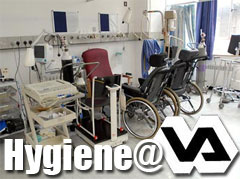 by Bill Poovey
by Bill Poovey
Thousands of veterans were at first shocked to learn they should get blood tests for HIV and hepatitis because three hospitals might have treated them with unsterile equipment. Now, just a couple of months after the Department of Veterans Affairs issued the dire warnings, veterans are growing frustrated by the lack of information from the tightlipped federal agency.
Nearly 11,000 former sailors, soldiers, airmen and Marines could have been exposed to infectious diseases because three VA hospitals in the Southeast did not properly clean endoscopic equipment between patients. On Friday, the VA revealed that another patient had tested positive for HIV, bringing the total to four such cases among patients who got endoscope procedures at hospitals in Miami, Murfreesboro, Tenn., and Augusta, Ga.
The agency also said a new hepatitis case had been discovered, increasing the number of positive tests to 26. More than 4,270 veterans still have yet to get test results.
Beyond those skimpy facts, the VA has said little else, citing an ongoing investigation.
It hasn’t answered questions from The Associated Press about why problems with cleaning the equipment — and possibly co-mingling infectious body fluids — went on for five years at the Miami and Murfreesboro hospitals and about a year in Augusta. The VA also refuses to say if it found similar problems at its other 150 hospitals or if more patients should get blood tests.
The VA has stressed that the positive tests are "not necessarily linked" to medical treatment at its hospitals, and infections don’t always cause symptoms and can go undetected for years.
Still, veterans are calling on the agency to release more information.
"This effort must involve continual updates on what the VA is learning about the extent of this situation," Vietnam Veterans of America President John Rowan said in a statement Thursday.
More facts are little comfort, though, to those who are already infected — and those that don’t know.
A 60-year-old Navy veteran who had a colonoscopy at a VA hospital last year got an unimaginable phone call recently — a blood test showed he had HIV. A second test by the VA was negative, and now, the Tennessee man doesn’t know what to think.
"I screamed out loud, `No’ and went over and held my wife and told her what happened," said the veteran, who spoke to The Associated Press on the condition of anonymity because he was afraid of repercussions against himself and his employer. "We had a nice, good cry. The things that go through your mind. You think your whole world is going to end. Her world could end, too."
It was not clear whether the Tennessee man was counted as a positive HIV test by the VA.
The VA said the problems with the endoscopic equipment had gone on for years, but were discovered in December when it learned the Murfreesboro facility wasn’t following cleaning procedures the manufacturer recommended. It issued an internal alert for hospitals to check their procedures, and the problem at Augusta was discovered in January.
On Feb. 9, the VA announced a nationwide safety check of endoscopic equipment used in colonoscopies and ear, nose and throat treatments. The procedure involves a narrow, flexible tube fitted with a fiber-optic device such as a telescope or magnifying lens that is inserted into the body.
Some veterans were warned in February to get tested, and more were alerted in March when the Miami hospital backtracked on its previous conclusion that it didn’t have a problem.
The day after the first HIV infection became public April 6, the VA announced that its top medical official, Dr. Michael Kussman, was retiring. Kussman still works at the VA but could not be reached for comment. VA spokeswoman Katie Roberts said there was "no connection whatsoever."
The endoscopic equipment is made by Center Valley, Pa.-based Olympus American Inc., and the company has said its recommended cleaning procedures are clear.
The VA and its inspector general have started investigations, and congressional members of the Veterans Affairs Committee have asked for a hearing in late May to discuss how the VA has been handling the problem.
U.S. Rep. Steve Buyer, R-Ind. and ranking member of the committee, said in a statement he and his staff have been briefed weekly by senior VA officials. His office declined to release more information.
Private hospitals have also spread infectious diseases with unsterile equipment, but requirements to report such problems vary by state and there’s no national regulation requiring disclosure, according to Barbara Rudolph, director of The Leapfrog Group, which advocates for quality health care.
The VA is providing a hot line for veterans and their families and posts the information it is releasing on its Web site. Because the VA hasn’t ruled out other hospitals having had problems, some veterans are wondering if its more widespread.
In Cedar Rapids, Iowa, former Marine Allen Lusk had several colonoscopies at the VA hospital in Iowa City and tested positive for hepatitis B in December.
"I never had it till I started going to the VA," said Lusk, 51.
He started using the VA in 2006 after he was injured when a car fell on him and he didn’t have health insurance. After seeing news reports about the contaminated equipment problems elsewhere, Lusk went to his county health department for an HIV test. He tested negative.
"To be honest, I’d like to see them come out and be honest about how big this really is," he said. "It might be embarrassing, but in the long run it might be better for them."
ATTENTION READERS
We See The World From All Sides and Want YOU To Be Fully InformedIn fact, intentional disinformation is a disgraceful scourge in media today. So to assuage any possible errant incorrect information posted herein, we strongly encourage you to seek corroboration from other non-VT sources before forming an educated opinion.
About VT - Policies & Disclosures - Comment Policy



